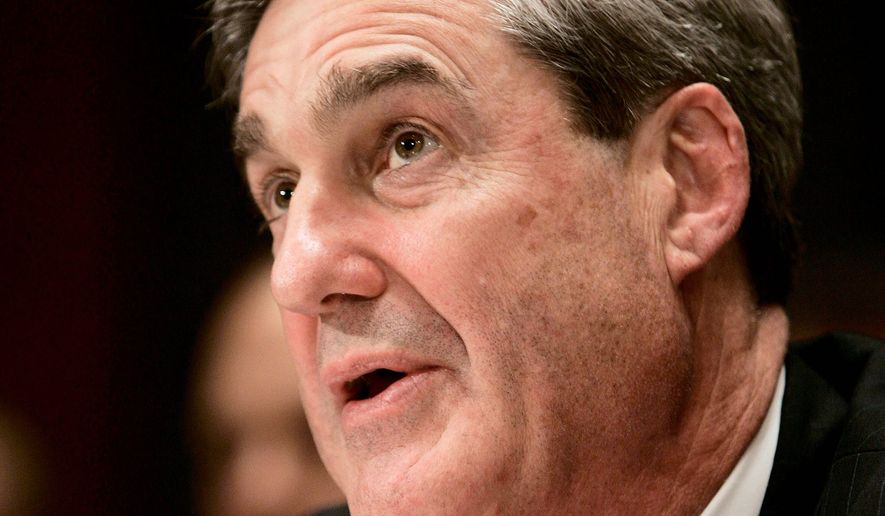OPINION:
A lot of snakes and scorpions live with the alligators in the swamp, and there are even more dangerous monsters there. No swamp creature is deadlier than a Washington lawyer.
The president is beginning to understand why he should never have agreed to his attorney general appointing a special prosecutor. We’re supposed to call him a “special counsel,” which may sound more upright, more punctilious and less fearsome, but words don’t fool anyone who lives in the swamp. A special counsel is hired to destroy the prey, like the gunfighter hired in Cheyenne to chase the sodbusters out of the valley.
The difference between a Cheyenne gunfighter and a special prosecutor is that the Cheyenne gunfighter is assigned to provoke a specific sodbuster to draw on him. A special prosecutor can choose an alternate target, just so he hits somebody. Kenneth Starr was hired to investigate Bill Clinton’s investments in White River waterfront property and wound up in Bubba’s underwear, and everything went downhill from there.
Robert Mueller was hired to investigate Donald Trump’s Russian connections, to get an indictment for something. “The Russian scandal” is recognized now to be a dry hole. So Mr. Mueller and his crack team of previously unemployed swamp lawyers are moving on to play the voyeur among the president’s business ventures. Maybe there’s something there. If not in the president’s ventures, maybe something nefarious in the business of his children or other associates.
The president, frustrated, angry and disdainful of the partisan perversion of politics in the swamp — undrained as it always will be — denounces the Mueller investigation as a witch hunt, and that’s about right. That’s what these special investigations are designed to be. “I am totally not surprised that Mr. Mueller is following [all] leads,” Steven Cash, a knowledgeable lawyer in the swamp, tells The Hill, the Capitol Hill political daily. “That’s the way all investigations are conducted, particularly into complex relations of business people.”
The frustration and anger on all sides will only get more intense as the long, hot summer fades into the long, hot autumn and then into a long, hot winter. “[Mr.] Mueller crosses the ’red line’ into potentially all of [Mr.] Trump’s billions in transactions. We now face a partisan war of investigative attrition.”
For a reputed master of swamp navigation, the Donald revealed himself to be something of a klutz in an interview with The New York Times, where he accused Robert Mueller of a “violation” of his and his family’s business dealings, and hinted that he holds “damaging information” on the prosecutor, presumably obtained about the time he interviewed him as a potential replacement for James Comey as director of the FBI. A similar hint that he had the goods on Mr. Comey turned out to be, like the Russian scandal itself, a nothingburger.
“The next day, [Mr. Mueller] is appointed special counsel. I said, ’what the hell is this all about?’ Talk about conflicts. But he was interviewing for the job. There were many other conflicts that I haven’t said, but I will at some point.” The president later added: “I have done nothing wrong. A special counsel should never have been appointed in this case.”
Or in any other case, he might have added. The idea of a special prosecutor is an abomination, as events have proved. There’s no shortage of lawyers with writs of law and authority that run as straight and true as need be. Since it defies belief that an attorney general, any attorney general, would appoint a special prosecutor without clearing it with his boss the president, any president, the question that Donald Trump could usefully ask himself is, “why did I do it?”
The special prosecutor serves at the mercy of the man he is investigating, and the president can sack him any time he feels the urge. This illustrates the absurdity of the special prosecutor office. Jay Sekulow, one of the president’s lawyers, has reminded everyone that the president can rid himself of Mr. Mueller if he thinks the investigation is not proceeding as he likes.
If he does, he should do it in a measured and straightforward way, not with a volley of impulsive tweets, and expect the roof to fall on him. Republicans who are more or less his friends are warning him not even to think about it. A remarkable dissing of the attorney general, who has done nothing to deserve it, or a jab at Rod Rosenstein, the deputy attorney general who actually appointed Mr. Mueller, is a fool’s way to bring it on.
But logic is not necessary in the great game of presidential politics, where the first rule is to beware of the swamp. It’s full of critters that know how to get you.
• Wesley Pruden is editor in chief emeritus of The Times.




Please read our comment policy before commenting.